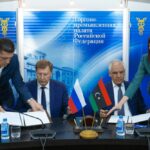JAKARTA: Current rotating chair of the Association of Southeast Asian Nations (ASEAN) Indonesia and China have said that both countries will intensify the negotiations for a South China Sea code of conduct.
Indonesian foreign minister Retno Marsudi and her Chinese counterpart Qin Gang said this to the media on Wednesday (Feb 22) during Mr Qin’s working visit to Indonesia.
Mr Qin is on a three-day working visit at the invitation of Mdm Marsudi where both ministers discussed regional as well as bilateral issues.
In their joint statement to the media, Mdm Marsudi said that Indonesia and ASEAN want a peaceful and stable South China Sea.
“Respect for international law, especially UNCLOS 1982, is key,” she said, referring to the United Nations Convention on the Law of the Sea which China has ratified.
“And after being delayed due to the pandemic, negotiations on the code of conduct will be carried out again and intensified in person.”
She added that Indonesia and ASEAN want to produce an effective, substantive and actionable code of conduct.
On China’s part, Mr Qin said that a new cold war and competition among major powers should not appear in the Asia Pacific region.
Reiterating a previous statement by his predecessor Wang Yi, Mr Qin added that countries in the region should not be forced to take sides.
“We believe that Indonesia and ASEAN will make their own independent assessment and choices based on stability, development and prosperity.”
He added that China supports ASEAN’s strategic independence and respects ASEAN’s centrality in the regional architecture.
“As littoral states in the South China Sea, Indonesia and China will work with other ASEAN member states to implement the declaration of conduct on the South China Sea and accelerate the negotiations for a code of conduct.”
The ministers did not mention when the negotiations would take place but earlier this month, Mdm Marsudi had said that they would take place in March.
The South China Sea is one of the most contested waters in the world.
China claims much of the South China Sea based on a nine-dash line map it uses to claim the waters which Indonesia considers as lacking international legal basis.
Indonesia is not a claimant state in the South China Sea but it has clashed with China in the past few years over fishing rights around Natuna Islands, which are near the disputed waters.
However, there are overlapping claims by ASEAN countries namely Brunei, Malaysia, the Philippines and Vietnam. The United States and its allies have also challenged China’s territorial claims.
ASEAN countries have been trying to negotiate a code of conduct with China since the 1990s. But negotiations have stalled due to various reasons, most recently because of the COVID-19 pandemic, which made it more difficult to hold in-person meetings.
SUPPORT TO END THE MYANMAR CRISIS
Besides the South China Sea, the foreign ministers also talked about the Myanmar crisis.
Mdm Marsudi expressed her appreciation for China supporting the Five-Point of Consensus to end the violence in Myanmar following the February 2021 coup.
“The Five-Point of Consensus is the main reference for ASEAN to help Myanmar out of its political crisis,” she said referring to the consensus adopted by ASEAN leaders in Jakarta in April 2021.
“As chair of ASEAN, Indonesia will conduct engagements with all stakeholders in Myanmar with one goal, namely to pave the way for the possibility of carrying out an inclusive national dialogue in Myanmar,” said Mdm Marsudi.
Mr Qin’s visit to Indonesia is his first to the region after assuming office about two months ago.
Together with Mdm Marsudi, they held the 4th meeting of the Joint Commission on Bilateral Cooperation (JCBC) between China and Indonesia earlier on Wednesday.
Mr Qin also made a courtesy call to President Joko Widodo on Wednesday morning. He will also visit the ASEAN Secretariat during his stay.
Source : ChannelNews Asia















